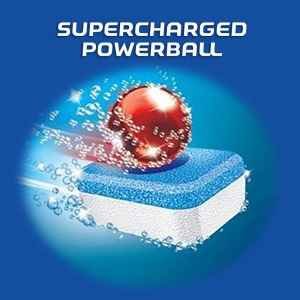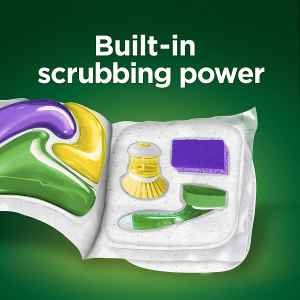Dishwasher detergent is an essential component of maintaining a clean and sanitized kitchen. However, the amount of detergent needed for each load can vary depending on factors such as water hardness, dishwasher type, and detergent type. In this article, we will explore the question of how many ounces of dishwasher detergent per load is required for optimal cleaning.
Table of Contents
Understanding Dishwasher Detergent
Before delving into the question of how much detergent to use per load, it is important to understand what dishwasher detergent is and how it works. Dishwasher detergent is a specialized cleaning solution that is formulated to remove food particles, grease, and other residue from dishes, glasses, and utensils.
Most dishwasher detergents are made up of several key components, including surfactants, enzymes, and other cleaning agents. Surfactants work to break down grease and food particles, while enzymes help to break down protein-based stains such as egg and milk. Other cleaning agents may include bleach or oxygen-based cleaners to remove stains and sanitize dishes.

Different Types of Dishwasher Detergent
There are several different types of dishwasher detergents available on the market today. These include powder detergents, liquid detergents, and detergent pods or tablets.
Powder Detergents
Powder detergents are the traditional type of dishwasher detergent and are still widely used today. They come in a dry, granular form and are typically less expensive than other types of detergent. Powder detergents are effective at removing grease and food particles, but can sometimes leave a white film or residue on dishes if not properly rinsed.
Liquid Detergents
Liquid detergents are another popular option for dishwasher cleaning. They come in a liquid form and are usually more expensive than powder detergents. Liquid detergents are effective at removing grease and food particles, but can sometimes leave streaks or spots on dishes if not properly rinsed.
Detergent Pods or Tablets
Detergent pods or tablets are a newer type of dishwasher detergent that has gained popularity in recent years. They are pre-measured portions of detergent that are placed in the dishwasher dispenser. Detergent pods or tablets are convenient and easy to use, but can be more expensive than other types of detergent.
Factors Affecting Detergent Amounts
There are several factors that can affect how much detergent is needed per load. These include water hardness, dishwasher type, and detergent type.
Water Hardness
Water hardness refers to the amount of minerals, such as calcium and magnesium, present in the water. Hard water can affect the performance of dishwasher detergent and may require more detergent to effectively clean dishes.
Dishwasher Type
The type of dishwasher being used can also affect the amount of detergent needed. Older dishwashers may require more detergent to effectively clean dishes, while newer models may require less.
Detergent Type
The type of detergent being used can also affect the amount needed per load. For example, detergent pods or tablets are pre-measured and typically require only one per load, while liquid or powder detergents may require more or less depending on the specific brand and formulation.
How Many Ounces of Dishwasher Detergent per Load?
The amount of dishwasher detergent needed per load can vary depending on the factors mentioned above. However, as a general rule of thumb, most dishwasher detergents recommend using between one and two tablespoons of detergent per load.
For liquid detergents, this typically translates to one to two ounces of detergent per load. For powder detergents, one to two tablespoons is equivalent to about half an ounce of detergent.
It is important to note that using too much detergent can actually be counterproductive, as it can leave a residue on dishes and in the dishwasher itself. Additionally, using too much detergent can be harmful to the environment and can contribute to water pollution.
To avoid using too much detergent, it is important to follow the manufacturer’s instructions on the package. It may also be helpful to consider factors such as water hardness and dishwasher type when determining the appropriate amount of detergent to use.
FAQs
- Can I use less detergent than recommended?
Using less detergent than recommended may result in dishes that are not properly cleaned. However, using too much detergent can also be counterproductive and may leave a residue on dishes and in the dishwasher. It is important to follow the manufacturer’s instructions on the package and consider factors such as water hardness and dishwasher type when determining the appropriate amount of detergent to use.
- What if I have hard water?
If you have hard water, you may need to use more detergent to effectively clean dishes. Consider using a dishwasher detergent that is specifically formulated for hard water. You may also want to consider using a rinse aid to help prevent water spots and film on dishes.
- What if I have a newer dishwasher?
Newer dishwashers may require less detergent than older models. Be sure to consult the manufacturer’s instructions for your specific dishwasher model to determine the appropriate amount of detergent to use.
- Can I use different types of dishwasher detergent interchangeably?
Different types of dishwasher detergent may have different formulations and may not be interchangeable. Be sure to follow the manufacturer’s instructions for the specific type of detergent being used.
- Is it necessary to use a rinse aid?
While not necessary, using a rinse aid can help to prevent water spots and film on dishes. Some dishwasher detergents may also contain a rinse aid component. Be sure to follow the manufacturer’s instructions for the specific detergent being used.
Conclusion
In summary, the amount of dishwasher detergent needed per load can vary depending on factors such as water hardness, dishwasher type, and detergent type. As a general rule of thumb, most dishwasher detergents recommend using between one and two tablespoons of detergent per load. It is important to follow the manufacturer’s instructions on the package and consider factors such as water hardness and dishwasher type when determining the appropriate amount of detergent to use. By using the right amount of detergent, you can ensure that your dishes are properly cleaned and sanitized while minimizing the amount of detergent used and its impact on the environment

